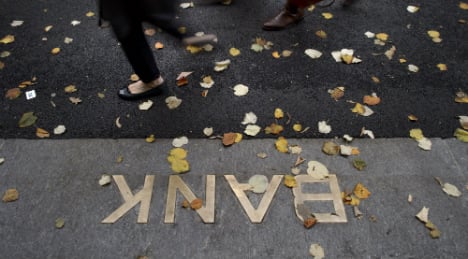Amid international pressure on Swiss banks to make amends for past practices of allowing and even helping foreign nationals hide assets from the taxman at home, the sector has been undergoing a seismic shift and is even bracing to give up its cherished tradition of banking secrecy.
In this climate, there is no point for the tradition-laden private banking sector to "hang onto an idealised but now reevaluated past," said Christophe Gloor, the head of the Association of Swiss Private Banks (ASPB), who also heads the La Roche & Co private bank.
Instead, he told bankers gathered for ASPB's general assembly in Basel on Friday, Switzerland's private banks — many of them still controlled by the families that founded them up to two centuries ago — should face the new reality "to better build the future."
Switzerland agreed a few weeks ago to phase out its long tradition of banking secrecy over the next two years, caving to pressure from foreign governments who since the international financial crisis kicked in in 2008 have become increasingly eager to lay their hands on hidden assets.
Switzerland reluctantly agreed to opening the way to an automatic exchange of banking data, laying waste to its long-held conviction that accounts should
be taxed but that all information about them should remain confidential.
"It is time to recognise that, unlike the United States, Switzerland does not have the capacity to impose its views on the rest of the world, even if they are based on reasonable concepts," Gloor said Friday.
The wealthy Alpine nation has reached deals with the United States aimed at ending a dispute over charges Swiss banks in the past helped US citizens hide billions of dollars from tax authorities.
More than a dozen Swiss banks have been under criminal investigation by the US Justice Department, including the country's second largest bank Credit Suisse, which was slapped with a hefty $2.6-billion fine last month.
The country's largest private bank, Julius Baer, is also on that list.
Many other private banks have meanwhile signed up to a programme where they acknowledge they may have unwittingly helped US citizens dodge taxes and say they will agree pay large fines in exchange for avoiding criminal prosecution.
France has also launched a programme to flush out undisclosed French funds, which French Finance Minister Michel Sapin maintains allowed Paris to rake in an extra €10 billion last year alone.
Some 23,000 French citizens have come forward under that programme since June 2013 to fess up to undeclared accounts abroad — 80 percent of them in Switzerland.
Swiss bankers meanwhile acknowledge they manage far fewer funds inside Switzerland today than they did in the past, since clients' assets are now being taxed and are therefore shrinking.
Bankers are therefore instead turning their sights abroad, where most institutions are expanding rapidly.
"Members of our association are relentlessly internationalising," Gloor said Friday.
Swiss banks provide, directly and indirectly, some 260,000 jobs in the wealthy Alpine nation.
But while Swiss private banks have seen their staff sizes swell six percent inside Switzerland over the past six years, their employee base abroad has ballooned 67 percent to nearly 900 in total.
"This tendency is strengthening," Gloor said.



 Please whitelist us to continue reading.
Please whitelist us to continue reading.
Member comments